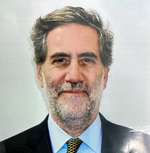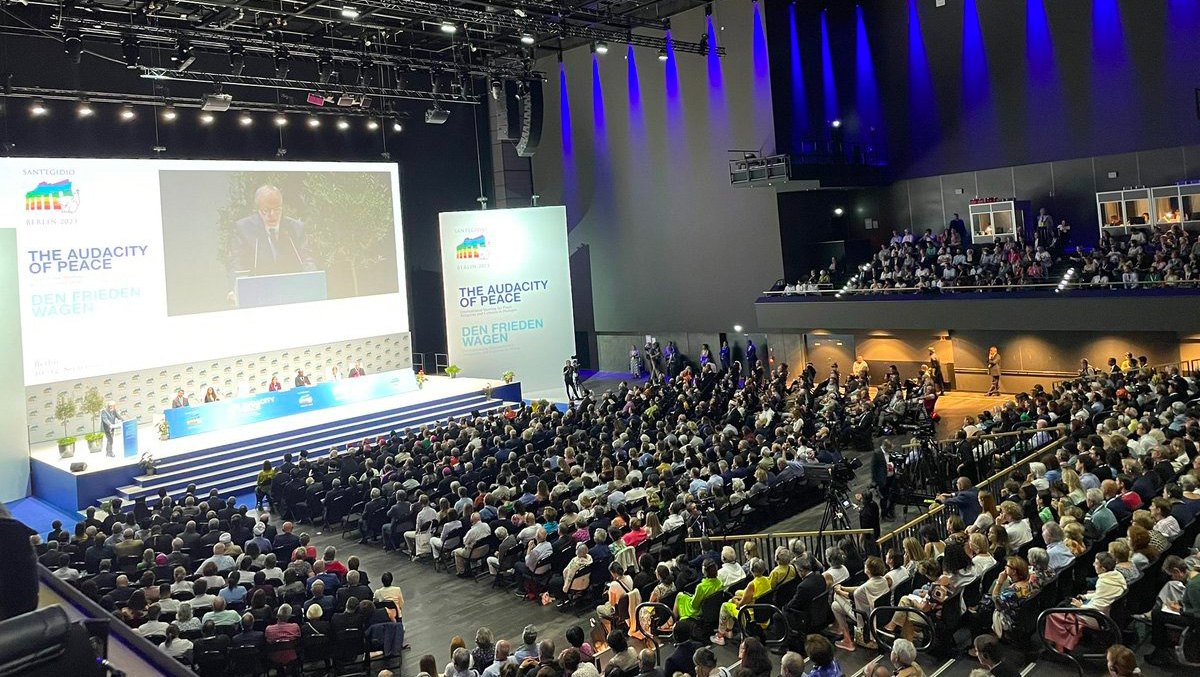
Welcome.
Welcome all to this panel that reaffirms something that is established and challenging at the same time. First, I would like to give the floor to professor Christoph Markschies, Director of the Academy of Sciences that is hosting us. Thank you for the opportunity to meet in this beautiful place.
We are here in this beautiful setting. A gathering hall where we can see vividly the sign of a war that should not be forgotten. We see the signs of bullets on the walls. The colums speak of the violence that destroyed the entire Berlin and killed many. It is important to remember. It is essential to focus our reflection on nuclear disarmament on the victims. More than 200,000 sisters and brothers were killed in Hiroshima and Nagasaki. Many experienced terrible suffering after the bombing. The Community of Sant’Egidio decided to remember them in a Vigil for Peace in New York City. Since last year many have been gathering for 75 uninterrupted hours between the time of the bombing of Hiroshima and the one in Nagasaki three days later. Every member of the Community of Sant’Egidio and every friend could participate remotely. Sant’Egidio is committed to remembrance and to the responsibility of learning from the past. This panel is an expression of that commitment.
The Treaty on the Prohibition of Nuclear Weapons expresses the decision of a large portion of humanity to live already in a world free from nuclear weapons. Yet, the existence of thousands of nuclear weapons in the nine countries that have them (Russia, United States, China, France, United Kingdom, Pakistan, India, Israel, and North Korea) makes that commitment mute. The nuclear challenge makes humanity more aware that we live on one earth, we share one planet, and we must find a sense of collective responsible for each other and for the nature that is giving us life.
The Catholic Chrch has expressed its position in many ways including Saint John XXIII in Pacem in Terris in 1963 simply stating “Nuclear weapons must be banned.” There has certainly been a change over the past decades in terms of the number of nuclear warheads present in the world - noting that during the peak of the cold war, the Soviet Union and the United States had more than 70,000 nuclear warheads combined, and today there are less than 13,000 all together. The path ahead must go through the three phases of attentiveness, disarmament, and abolition. We must pay attention more to nuclear risk and work diligently towards abolition through disarmament.
The panel today came about through a series of conversations among people with an expertise in nuclear disarmament and those concerned wih the prevention of mass atrocities and genocide that led to the formation of the Global Action Against Mass Atrocty Crimes - GAAMAC. The starting point was the observation that the two cases of an actual use of atomic weapons in war, the bombing of Hiroshima and Nagasaki, has significant consequences for the civilain population present at that time and for subsequent generations. The more than 2,000 nuclear tests done between 1945 and today have had significantly destructive results and effects that continue even until today.
It seems to us that it is essential to frame the conversation on Nuclear Weapons keeping in mind the consequences on the human population and nature. The theme of these three days in Berlin is "The Audacity of Peace" and we believe that it is indeed necessary to be audacious and yet realistic in imagining a world without nuclear weapons. So we are inviting the speakers to reflect on the 1) current conditions, 2) trends, 3) risks, 4) and possible strategies.
We have four distinguished panelists today and the conversation starts in the context of the Prayer for Peace as a secular, Buddhist, and Christian one but it is clearly open to a universal horizon and it will continue seeking contributions of interlocutors of any faith and no faith.
Members of the audience will have an opportunity to interact wth the panelist in the second portion of the panel. Please prepare yourself and be ready to intervene. I am delighted to introduce the speakers in the order in which they will speak:
Liberata Mulamula is member of Parliament,Tanzania. A diplomat and politician who served as Minister for Foreign Affairs and East African Cooperation, she was ambassador to the United Nations in New York City, Canada and the United States of America; Permanent Secretary at the Ministry Foreign Affairs and East African Cooperation; and first Executive Secretary of the International Conference on the Great Lakes Region (ICGLR) oversing Peace, Stability and Development in 11 countries in the African Great Lakes Region. She has been a founding member of the Global Action Against Mass Atrocity Crimes - GAAMAC.
Emmanuel Dupuy is President of the Institute for European Perspective and Security Studies (IPSE), a think tank focused on track two diplomacy and strategic prospective analysis with offices in Paris, Brussels and Rabat. He is an Associate Professor at the Catholic University of Lille, as well as various universities across the world (Geneva, Hanghzou), specializing in war and security studies. Emmanuel Dupuy served as advisor to the French Secretary of Defence and Veterans Affairs (2008-2010), and political advisor to French military forces deployed in Afghanistan (2011).
Yoshinori Shinohara serves as the Secretary General of the Asian Conference of Religions for Peace and Secretary General of Religions for Peace-Japan. After graduating in 1998 from Gakurin Seminary in Tokyo, he received ordination as a Dharma Teacher in Rissho Kosei-kai, a major Japanese Buddhist denomination. He received a master’s degree in Conflict Resolution from the University of Bradford in 1998 and started to work for Religions for Peace-Japan in 2005. He co-led the ARMS DOWN! Campaign for disarmament and MDGs in 2010. Rev. Shinohara received a master’s degree in Public Policy from the University of Tohoku in 2014, and a PhD in Human Security Studies from the University of Tokyo in 2021.
Robert Harrap has been the General Director of SGI-UK since December 2013. Before that he spent 16 years as a barrister in chambers in London’s Inner Temple. Prior to his appointment as General Director Robert served as both the Men’s Leader and Head of the SGI-UK Study department. He has practised Nichiren Buddhism for 30 years and lives in the village of Taplow with his wife, Claire.
This panel is a beginning. it is the sign of a commitment of the Community of Sant’Egidio and the Prayer for Peace to strengthen the resolve to disarm, to move with audacity towards the abolition of nuclear weapons. May our words be an invitation to live and work with the audacity of peace.
